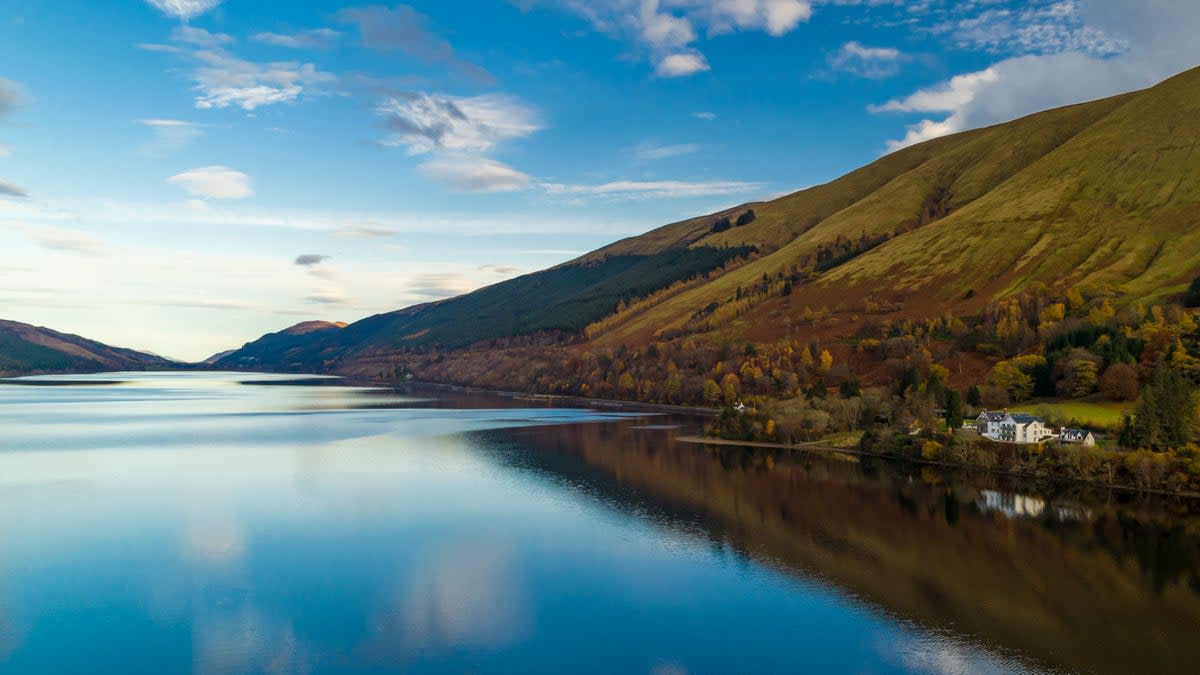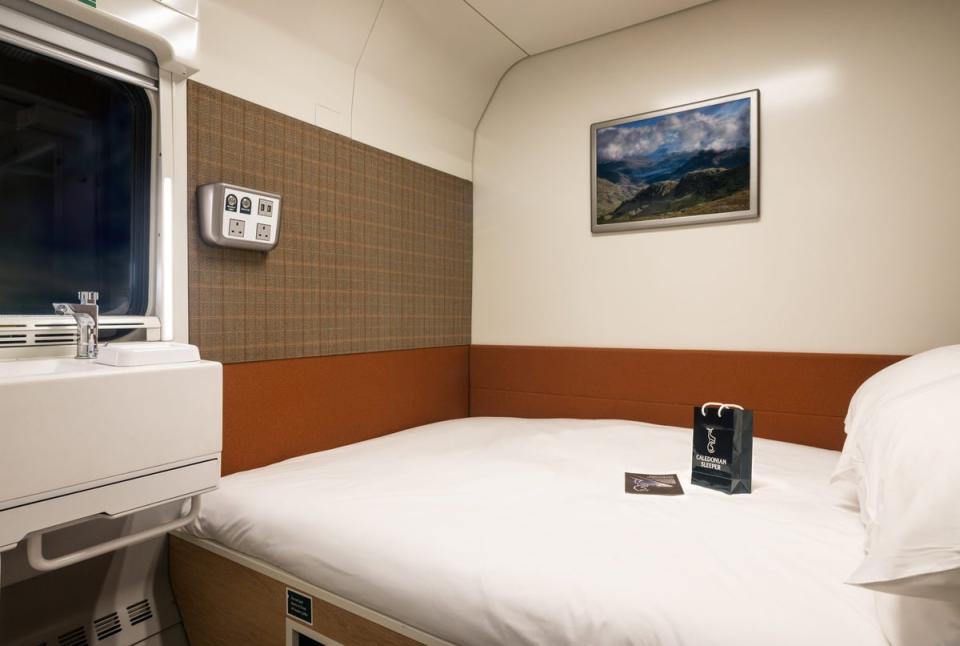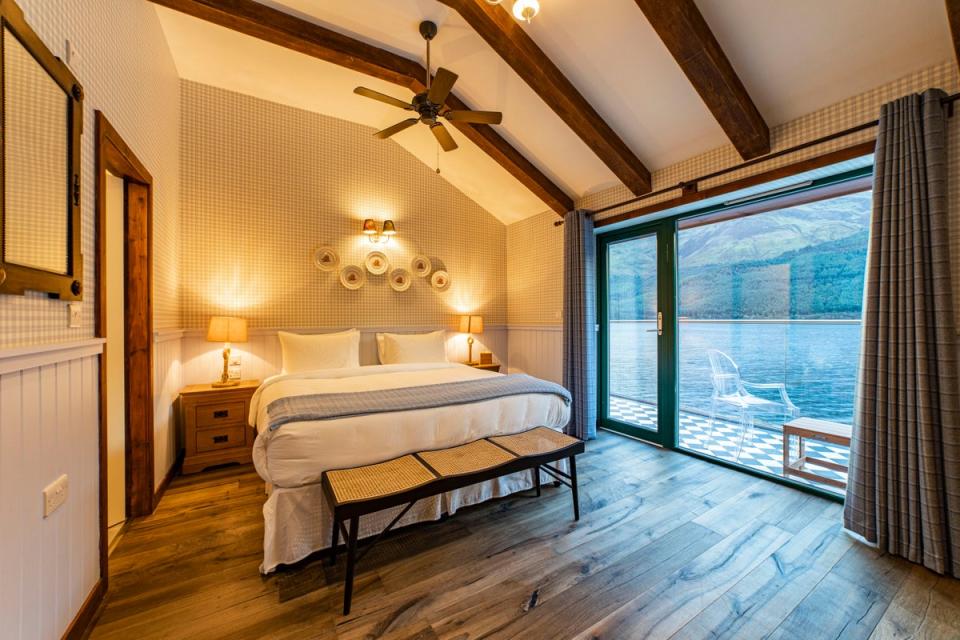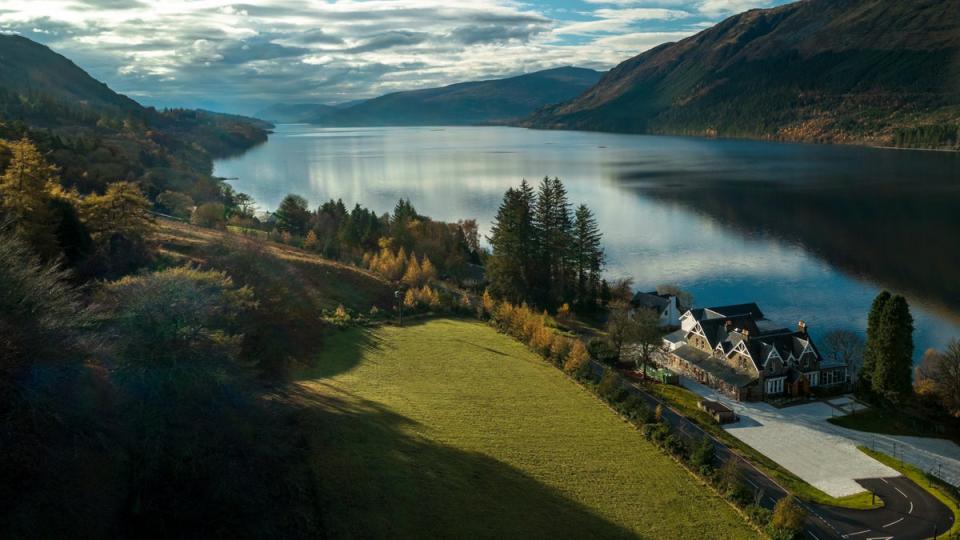Take the train for a sustainable Scottish Highlands adventure

Rugged, snow-capped mountains; deep and mysterious lochs; swathes of wild heather, gorse and moss. We arrive in Scotland to nature worthy of the most heart-lifting Robert Burns poem. The early morning sun breaks through a crisp spring morning, illuminating the breathtaking rolling landscape in front of us. Enter a herd of wild deer, seemingly thrown in for good measure by a mastermind scene-setter.
I first spy it from the comfy dining car of the Caledonian Sleeper Highlander train. Having set off from the concrete jungle of London’s Euston station 12 hours before, the contrast is immense: I can’t help but feel the Scottish Highlands are reminding me exactly what is at stake when we talk about protecting the environment.
As we emerge from the long shadow of Covid, it feels like a moment of reckoning – or at least radical reimagining – for the travel industry. Concepts like flygskam (flight shame) have emerged in Sweden, as well as its flipside, the more positive tågskryt (train brag). With an established UK Flight Free movement – even The Independent’s travel editor has committed to another flight-free year – long-range train travel is firmly on the up.

In April, a McKinsey survey found that 36 per cent of respondents plan to fly less going forward in order to reduce their climate impact; meanwhile, transport emissions were found to be a top concern of respondents in 11 of the 13 countries polled. Myself? I’d count myself as part of that 36 per cent.
It was with this spirit that I booked a berth on the Caledonian Sleeper to Fort William in the Highlands. Not only does going by train give one the feeling of being the heroine of an Agatha Christie novel, but the train operator says it has a carbon footprint nearly 75 per cent lower than the equivalent journey by motor vehicle (33kg CO2 versus 137.5kg) and 90 per cent lower than by plane (33kg CO2 versus 288.9kg).
Midway along the track, I feel a frisson of pride – tågskryt, is that you? – slightly tempered by the train fare costing at least double the price of a budget flight, which gives some food for thought.
Our sustainable stay for the trip is Whispering Pine Lodge, on the edge of tranquil Loch Lochy. Built in the 17th century as a hunting lodge, it’s a quaint hideaway that merges nods to both its historic past with more luxurious mod cons, and a small but perfectly formed spa.
With such an idyllic, nature-wrapped setting, it’s no surprise that our tartan-accented room made the most of the views: huge floor-to-ceiling windows meant we felt immediately immersed in the unspoilt Scottish landscape. We settled in for a dram of whisky, watching the last of the sunshine disappear behind the hills as the night rolled in.

Whispering Pine’s owner, Black Sheep Hotels, prides itself on putting the environment at the heart of things. The lodge sources fresh water from local burns (waterways), reducing single-use plastic, and uses locally-sourced products like toiletries from the Highland Soap Company, whose factory is just 15 miles away. The kitchen and bar also overflow with hyperlocal goodies. At aperitif hour, we loved the Glen Spean Highbridge IPA beers, the Eilean-Òr craft brews made on Skye with porridge oats (could they be more Scottish?), and the unique Devil’s Staircase spiced gin.
Meanwhile on our plates were local fish from Iain Stewart Fishmongers and meat from Lochaber Larder (both 15 miles away in Fort William), and ice cream from Luvians in Fife (140 miles). Eating locally matters when we consider that 25 per cent of all miles covered by heavy goods traffic in the UK is for moving food and emissions for transporting food within, to, and across the country are an estimated 19 million tonnes of CO2 each year – equivalent to the annual output of 5.5 million cars.
One particularly delicious local touch are the kulfi desserts, made in-house. Traditional Indian ice cream might seem a surprising spot on a Highlands trip, but Whispering Pine has a focus on subcontinental cuisine, created under the watchful eye of Indian-born head chef Sinclair Pinto. It’s a nod to the long history of Scottish regiments bringing Indian influences and spices back to these uplands.
By day, we head out on jaunts to National Trust sites like the high-arched Glenfinnan viaduct – Harry Potter fans, this one’s for you. Staff here are also promoting locally-sourced food and drink, even displaying handy maps of which bit of Scotland each snack had travelled from.
On another excursion we travelled 1,221 metres up the scenic Aonach Mor, which sits adjacent to the UK’s biggest mountain, Ben Nevis. Rather than scaling it on foot, we opted for a little help from the Nevis range gondola. The lift and its base station have been powered by a hydroelectric scheme, the Nevis Range Hydro Company, since December 2016.

One area where you may have to lay aside your eco-credentials – in the absence of a comprehensive public transport network – is driving between the sights. We hired a car to venture on as far as the charming Eilean Donan castle on Skye – but if you do want to continue the train journey once you reach Scotland, ScotRail has a handy carbon calculator you can use to work out your emissions. Three-quarters of passenger journeys on the network are already taking place on electric trains and it aims to fully decarbonise by 2035.
But it would have been just as easy to stay by the Loch – immersed in nature and breathing in lungfuls of fresh Scottish air, taking endless mental snapshots of the spectacular landscape on our doorstep. Beginning to change the way that we travel can feel at best daunting, and at worst downright impossible, but on the final morning, as we walked down to the hotel’s pebble beach to skim stones on the loch and take the view in for one last time, the sun warming our faces, I remembered why it matters. And if Scotland’s businesses are poised and ready to help us do better, well, that’s alright with me.
Travel essentials
Getting there
The Caledonian Sleeper Highlander train has returns to Fort William from London in a single or twin bunk sleeper cabin, from £140 solo or £170 shared, each way.
Staying there
Black Sheep Hotels has three hotels in Scotland with sustainability at the heart of things. Doubles at The Whispering Pine Lodge from £125, B&B, and £110 at the other locations.

 Yahoo News
Yahoo News 
